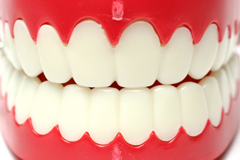
Let's talk about teeth. Our experiences with dental care are a great way of getting our heads around how private health insurance works and whether this is a road we want to travel. For Canadians, going to the dentist approximates what our American cousins experience when they go to the doctor.
Take me, for example. A couple months ago, while crunching on a pistachio nut, I broke off a big piece of one of my molars. A week later, it was good as new after half an hour in the dentist's chair.
What about payment? Simple. I didn't pay anything. Behind the scenes, an electronic form was processed and my private health insurance company paid the dentist directly. I never saw a bill and had no idea how much the cost of my treatment was.
Out of curiosity, I looked up my recent visits to the dentist on my insurance company's website. I received about $600 in dental services last year. My semi-annual checkups come to $190 per visit, plus an extra $220 to fix the broken molar.
Unlucky 40 percent
I am one of the lucky ones with gold-plated coverage. Thanks to my employer, who pays the bill for a workplace extended health care plan, my family gets excellent dental care.
My own access to dental care is a model for the way it should be for everyone - health care should not stop where your mouth begins. But according to the Canadian Institute for Health Information, only three-fifths of people are covered in some form by a private health insurance plan. There are differences in the quality of private insurance plans. Some people have to pay a monthly fee, and have a co-payment or deductible associated with their treatment. But they are still fortunate, as the bulk of their dental costs are paid for.
The remaining two-fifths of the population, those without any coverage, have a simple choice: pay up or go without. And the data shows that the majority of those without coverage simply do not get the care they need. Over a quarter of adult Canadians did not seek needed dental care in 2004 because of cost.
This is essentially how private health insurance works: some get top-notch coverage, some get adequate coverage, others get nothing. And the higher your income, and the better your job, the more likely you are to have private health insurance.
There are a few exceptions: most provincial health care plans cover dental care for people on welfare, and if you were ever in really bad shape, the public system would cover an operation (at a greater cost than preventative checkups, of course).
Huge hidden subsidies
Ironically, private health insurance is highly subsidized by the public system. Going to the dentist has an economic value to me, but I pay no tax on the "income" I receive in the form of health benefits. And if my employer were a for-profit operation, they would be able to deduct the costs of the workplace health plan.
All counted, the Canada Revenue Agency's forgone tax revenue is a subsidy to the private health insurance industry of around $5 billion per year, according to UBC Health Economist Robert Evans. In the US, the subsidy is closer to $250 billion, worth one-third of companies' premium revenues.
In spite of the large public subsidy to private insurance - and public coverage for the very poor, seniors and veterans - there are 45 million uninsured Americans who live in fear of a health care crisis. And rising health care costs are prompting companies to reduce or eliminate their private health insurance benefits in the name of staying "competitive."
US switcheroo?
As a result, Canada's public insurance model is getting some attention. American economist Paul Krugman points out that in the US system "government pays directly or indirectly for more than half the nation's health care, but the actual delivery both of insurance and of care is undertaken by a crazy quilt of private insurers, for-profit hospitals and other players who add cost without adding value. A Canadian-style single-payer system, in which the government directly provides insurance, would almost surely be both cheaper and more effective than what we have now."
Just as Americans are starting to wake up, private health insurance in Canada is on the verge of intruding into the public system. Last year's Supreme Court Chaoulli decision was heralded as a victory for private health insurance in Canada - and without a single shrill cry of "judicial activism" by conservatives. This year, private options are on the move in BC, Alberta and Quebec.
We should be moving in the opposite direction, by rejecting the inequities and inefficiencies of private health insurance and by expanding the coverage of the public system. For starters, let's put our money where our mouth is and add dental coverage to the list of publicly insured health care services.
Marc Lee lives and works in Vancouver, where he is a Senior Economist with the BC Office of the Canadian Centre for Policy Alternatives. ![]()















Tyee Commenting Guidelines
Comments that violate guidelines risk being deleted, and violations may result in a temporary or permanent user ban. Maintain the spirit of good conversation to stay in the discussion.
*Please note The Tyee is not a forum for spreading misinformation about COVID-19, denying its existence or minimizing its risk to public health.
Do:
Do not: